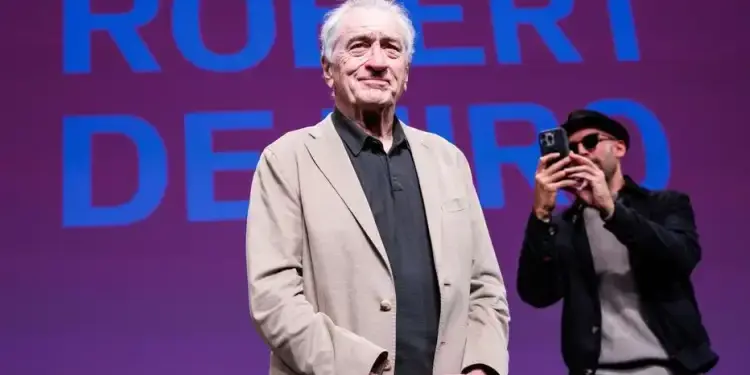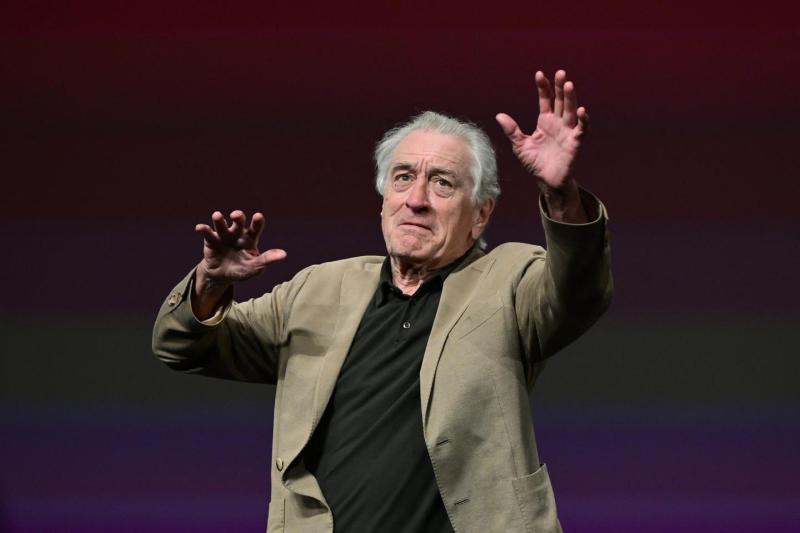During the opening ceremony of the 78th edition of the Cannes Film Festival, Leonardo DiCaprio, who came to put the palm of honor to Robert de Niro, slipped into his speech a remark as affectionate as it is spicy: “It is difficult to snatch a word from Bob. The next day, this dash of humor took on its full meaning. The American actor was expected to do with the “meeting” with the public, as part of the interview series organized each year by the festival. A conversation supposed to offer rare access to the thought and the journey of a huge actor. A cinema lesson, as they say.
Presented by Thierry Frémaux, Robert de Niro was greeted by a huge standing ovation. The Debussy room was packed: the public had come in number, with the hope of listening to it for a long time.
But very quickly, the exchange changes elsewhere. It will not be a Master Class, or even a real dialogue. Rather a very personal speech by plastic artist JR, who drives the meeting in his own way, by multiplying interventions, anecdotes, images. Robert de Niro remains behind. Present, but distant. Silent. Little dissertation. And despite the curiosity and admiration that its coming always arouses, the moment leaves a taste of unfinished.
A meeting that hides
It must be said: it is JR who speaks the most. He monopolizes speech, he imposes his subject. He tells of their first collaboration, the shootings they have led together for three years, the ideas they pursue, the images they have captured. He is obviously passionate, invested, sincere. But too too talkative. And it ends up weighing. Because in the room, we did not come to hear JR, as talented as it is. We came for Robert de Niro. However, this one is satisfied with a few words, often a “yes” or a nod. JR asks questions to which he himself answers, leaving Robert de Niro only the laconic response time. And even if we feel a real complicity between the two men, we can’t help but think that the French artist takes up too much space. The voice of Robert de Niro, which was expected, dissolved in the chatter of his interlocutor.
A memory work under construction
The heart of the meeting is based on an unprecedented project: a documentary that JR has been shooting with De Niro for three years, in the intimacy of the actor. It all started with a request from JR: film a few minutes in the workshop of Robert de Niro Sr., the actor’s father, a painter who died in 1993. The workshop remained frozen, intact. It had to be a short sequence. Finally, they spend five hours there. Then come back. And a film is installed, without script, without specific goal, without calendar.
De Niro accepts that the camera explores his memories. He rediscovers letters from his mother, reads his father’s newspaper for the first time. He shares personal images: moments with his children, an ultrasound, a moment with his autistic son who painted. The whole is moving, sometimes overwhelming. There is something sincere, true. We see a modest man, almost vulnerable, who chooses to show what he has never revealed.
This gesture, more than a testimony, is similar to an act of love. He says something deep on Robert de Niro: his visceral attachment to his parents, his need to preserve their memory, his desire that their traces will not fade. It is not only a question of returning to your past, but of transmitting the substance to your children. We understand, through the fragments delivered, that this company is a legacy. A way of telling what he may never be able to say, and to make his father artist and his protective mother exist in the family imagination. This film is not a narcissistic exercise. It is a tribute, a tense bridge between generations.
A work in progress, at its own pace
The film has no title yet, no end announced. He advances to the rhythm of life. Robert de Niro finances the project himself. He has no exit obligation. “” The most important thing, he says, is to persevere until the day we say to ourselves that we have said enough. “And again:” It is not essential that I see the result. I hope I will see it. But if not, you will find things in my archives. And once I don’t be there anymore, JR will continue to film myself, even in my coffin! A sentence he launches with humor.
We feel that this work is important to him. He says: ” I don’t want to do it, but I know I have to do it. As if it were a duty to his father’s memory. Of a gesture of repair. In a way of saying what he could never say. He talks about the difficulty of approaching certain images, of the shock caused by him the rereading of his story. These confessions, when they arise, are precious.
This is perhaps that, in the end, the most striking: Robert de Niro, so often locked in silence, is delivered here otherwise. Not in words, but in memory fragments. He rebuilds, through these images, a family story that he wants to preserve. He does not only open a door to his intimacy: he builds an archive, a transmission, a testimony intended to survive time.
But a frustrating moment for the public
Despite this, it is difficult not to come out frustrated from this meeting. The project is touching, it is undeniable. The images shown on the screen are beautiful. And see Robert de Niro in this posture of son, father, man in front of his absences, upset. But that moment could have-should have been something else. A real conversation. Perhaps a exposure, but shared. Now everything seems oriented by JR, who monopolizes the word, even if it means giving the session an air of stretched making of rather than a real meeting.
We would have liked to hear Robert de Niro talking about cinema, his roles, his choices, his doubts as an actor. We would have liked the man to reveal himself by his words, not only by prepared images. Now it never stretches. Does not come back to any movie. Does not give any key. You have to be satisfied with a look. Of a sigh. With a smile. It’s part of its mystery, of course. But as part of an “meeting” with the public, it leaves a void.
A silent tribute
In his own way, Robert de Niro remained faithful to himself: reserved, modest, almost elusive. He did not try to seduce or shine. He simply let glimpse, by fragments, an intimate facet of his life. It was not without interest. But it was not enough. And in an edition where the festival pays tribute to him, where an honorary palm of gold is awarded to him, where a whole career is praised, this meeting could have been a highlight, a summit. It was only a whisper.
A precious whisper, of course. But a whisper all the same.
Neïla Driss










